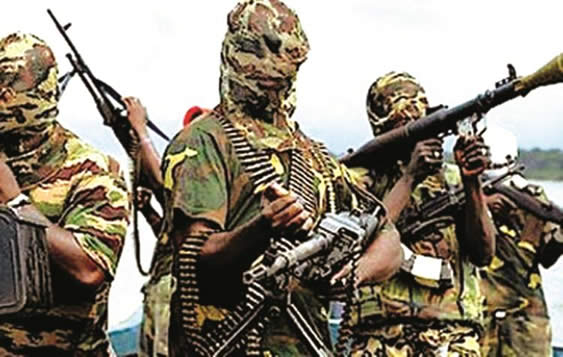How Boko Haram became a transnational threat

AlexanderMezyaev Correspondent
In recent years we have seen many radical organisations become internationalised – factions that once confined their operations to within defined state boundaries have been converted into transnational terrorist corporations. Of course, certainly not all radical organisations make this transition. Some, such as the Taliban, remain domestic entities. However, many are suddenly able to easily transcend the national boundaries of not only neighboring countries, but whole regions that they are able to overtake. This was the sort of transformation made by Al-Qaeda and the Islamic State. We are now watching Boko Haram (BH) undergo a similar metamorphosis into a transnational terrorist corporation.
During its 13 years of existence (or active existence, at least) Boko Haram has been responsible for hundreds of terrorist attacks, resulting in a death toll in the tens of thousands. So when the new president of Nigeria, Muhammadu Buhari, took office, there was a good reason why his first move was to take rapid steps to create an inter-African coalition to fight BH.
First, Buhari (a former army general) shifted his army command out of the capital and into the strategically important center of Maiduguri, which is very close to the hub of BH’s operations. Literally only a few days after his inauguration, he paid visits to the rulers of Niger, Chad and Benin and also arranged a meeting of leaders in Abuja.
A decision was made at that meeting to establish the Multinational Joint Task Force (MNJTF). The MNJTF commands 8 700 soldiers who were expected to be fully deployed by July 30, and a Nigerian general, Tukur Buratai, has been appointed its commander.
President Buhari also demonstrated the seriousness of his intentions with a special visit to Cameroon for a personal meeting with President Paul Biya. Cameroon, which is also under constant attack by BH, had previously sent only its minister of defence to the negotiations.
Such decisiveness is quite telling, especially given the undeniably complex relationship between Nigeria and Cameroon. The two countries were involved in a lengthy territorial dispute that was resolved in 2002 by the International Court of Justice.
However, there were certainly flaws in the way that conflict was settled: formally the issue was decided in favour of Cameroon, but as a practical matter – France came out on top, because at the time the decision was announced, the president of the International Court of Justice was French. … However, Buhari managed to transcend the difficult relationship between the two countries in order to pay a visit to Cameroon.
Boko Haram has a fairly long history of individual attacks on Christian churches in Nigeria, but now they have taken their operations to a new level and have begun striking against Muslims and the civilian population in general, without discrimination. For a long time BH was seen as a solely Nigerian problem, but gradually they have begun to launch raids within neighboring countries as well, primarily in Cameroon, in addition to Chad and Niger. And their victims are certainly not limited to Christians (although attacks openly aimed at Christians continue) or even students receiving a Western education.
BH’s galvanised transition from a local to a transnational organisation is clearly evident. Acts of terror and armed, direct attacks are occurring simultaneously in various spots in the region, resulting in many victims and showing evidence of first-rate operational training. On June 16 there was a massive terrorist attack in the Chadian capital of N’Djamena. It was on a scale unprecedented in Chad even compared to the last war waged by that government.
Nothing like it had been seen even during the civil war of the 1960s or during the perennial domestic unrest found in some parts of the country. In 2015 alone BH has launched a number of attacks on towns in Niger, during which several dozen people have been killed, mostly women and children.
Buhari’s efforts culminated in his on-the-spot creation of a quadripartite coalition and in the onset of its active and coordinated efforts against BH. Even before all the parties to the MNJTF were fully on board, each of the coalition’s member states was already acting on its own, taking defensive and offensive steps against this common enemy.
For example, on June 25, Nigerien troops wiped out 15 militants from BH and captured another 20. And from reports it is not yet clear within whose borders they were killed.
When Boko Haram began its operations, it was generally assumed that the organisation’s real goal was to fight Western influence, but then it gradually became clear that this was just a cover story. Another version of the myth espoused by BH – that they oppose Christians – has also slowly disintegrated. That fiction had been discredited long before BH began terrorising Muslims.
It is now clear that BH’s goal is to internally destabilise Nigeria. The killing of Christians was intended to kindle interreligious strife – something to which Nigeria is extremely susceptible. When this tactic failed, they resorted to more conventional butchery, trying to incite chaos and panic.
Today, any country that attempts to start down the path of development is confronted by the problem of insurgent/terrorist organisations. There can be no doubt that BH is a creature with global power. This was once again confirmed by the recent report from the prosecutor for the International Criminal Court (ICC) about the investigation of the situation in Nigeria.
The Nigerian government filed a lawsuit with the ICC against BH, but then the ICC launched an investigation of the Nigerian government itself for violating human rights during the fight against Boko Haram!
On June 5 the UN High Commissioner for Human Rights, Zeid Ra’ad Al-Hussein, also added his voice to the defence of BH, expressing utmost concern about the killings, total terror, and other grave human-rights violations committed by rebels in northeast Nigeria, as well as the violations of humanitarian law by that country’s armed forces.
Here we see how BH has been seated in the dock alongside the forces battling against them. And the use of the term rebels is very suggestive when speaking about terrorists. It is no accident that the human-rights advocate lodged no grievances against BH, but instead ordered the government of Nigeria to conduct an independent investigation of its own forces that are leading the fight against BH – i.e., he demanded that that struggle be undermined. But who will fight terrorists if they are going to be persecuted for it?
Moreover, a new note can now be heard in the songs sung by global powers: they are demanding an end to the human-rights violations allegedly committed not only by government forces, but also by some pro-government factions. No information has been provided as to who these might be. But it is clear that if Nigerian officials begin to persecute their own citizens who are forming militias to fight BH, that government will be tossed aside, or the entire fight will be neutralised at the very least. Now we see the proof of this.
It is also worth noting that Buhari has decided to replace those agencies upon which his country had been relying in its fight against BH. Previously the US and the G7 nations had provided support, but in 2014 the Nigerian government also began to receive assistance (including satellite intelligence) from China.
And in 2015 help even began arriving from Russia. What’s more, the overture to Russia was made because the US and other Western countries failed to send supplies. According to Nigerian media reports, special op forces in the struggle against BH have been sent to Russia for training. In addition, Russia has supplied weapons directly to Cameroon to combat BH.
Judging by the reaction of the ICC and the UN human-rights advocates, the efforts of Nigerian President Buhari and the new coalition of countries to combat terrorism (in a broad sense) have been effective indeed. – nsnbc










Comments